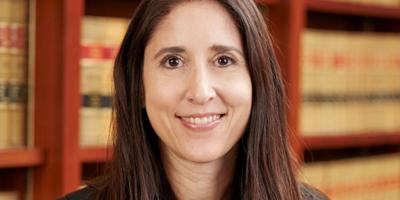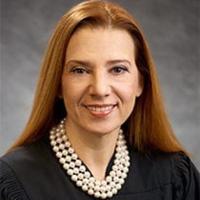
California Supreme Court Chief Justice Patricia Guerrero
SACRAMENTO - The California Supreme Court says a California state law that would require all workers at nursing homes in the state to abide by and use the preferred pronouns of transgender and other LGTBTQ patients or risk termination, lawsuits, fines and potentially even imprisonment doesn't violate the First Amendment.
On Nov. 6, the California state high court unanimously upheld the law, saying the law is "narrowly tailored" enough to survive constitutional scrutiny because it only affects the "conduct" of nursing home workers on the job, and not their otherwise constitutionally protected speech rights.
The decision was authored by California Supreme Court Chief Justice Patricia Guerrero.
The law, the court's justices said, "seeks to protect long-term care residents’ right to be free from discrimination in a setting in which they constitute a 'captive audience' in what has become, in effect, each resident’s home.
"The provision regulates conduct by staff persons whose job is to provide and support medical treatment and intimate personal care — thereby seeking to promote an environment conducive to such treatment and care. It is carefully calibrated and does not restrict long-term care facilities’ staff from expressing their views about gender to anyone (including a resident) in any otherwise lawful manner other than by misgendering a resident — and even then, the prohibition is limited to willful, repeated, knowing acts done because of a legally protected characteristic," the court said in the ruling.
The case centered on a dispute over the constitutionality of the 2017 California state law known as the LGBT Long-Term Care Facility Residents' Bill of Rights.
Specifically, the lawsuit centered on a provision within the law that makes it illegal for "staff at long-term care facilities from '[w]illfully and repeatedly fail[ing] to use a resident’s preferred name or pronouns after being clearly informed of the preferred name or pronouns,' when they do so 'wholly or partially on the basis of a person’s actual or perceived sexual orientation, gender identity, gender expression, or human immunodeficiency virus (HIV) status.'”
That provision was challenged by a group known as Taking Offense, ostensibly seeking to protect nursing home workers concerned about the potential for workplace discipline and termination, hiring discrimination or even state action, including fines and up to a year in prison, should they refuse to abide by the law.
Taking Offense described itself in court documents as an organization "dedicated to opposing efforts 'to coerce society to accept [the] transgender fiction that a person can be whatever sex/gender s/he thinks s/he is, or chooses to be.'"
Taking Offense argued the law is a blatant violation of the First Amendment rights of Californians who may object to the requirement to speak in a manner mandated by the state, potentially against their own beliefs, as a condition of employment or even being able to be employed.
After a Sacramento County Superior Court judge ruled in favor of the state and dismissed the action, the California Third District Court of Appeal sided with the plaintiffs, agreeing the law impermissibly clashed with the First Amendment's free speech guarantees.
The state, however, appealed to the state Supreme Court.
And there, Justice Guerrero and her fellow justices all agreed the state had the legal authority to regulate the workplace speech of nursing home workers without worrying about the First Amendment - including potentially jailing them for repeatedly "misgendering" a patient, should a court determine their conduct had made the nursing home "hostile" for transgender patients.
In the ruling, the state Supreme Court said the challenged provision can survive constitutional scrutiny because the court determined it is no different than any other law prohibiting discrimination in workplaces or health care environments.
They said the law doesn't target the beliefs of workers, only their conduct in the context of providing care in a health-related workplace, which is already a heavily regulated environment.
"The provision regulates the professional conduct of long-term care staff whose job is to provide and support medical treatment and intimate personal care — and seeks to promote an environment conducive to such care. It is carefully calibrated to achieve those ends, and does not preclude facility staff from expressing their views about gender to anyone (including a resident) in any otherwise lawful manner other than by misgendering a resident — and even then, the prohibition is limited to willful, repeated, knowing acts done because of a protected characteristic," the court wrote.
In the ruling, the state Supreme Court also agreed with the state that Taking Offense lacked standing to bring the lawsuit at all, because the law the group relied upon should only be read to allow such lawsuits against local governments, and not state officials or agencies.
However, the court said they believed they could still hear the case and render a decision on the constitutional question. If the court did not, the justices said, "a cloud over the constitutionality of the statute — a significant matter of public interest — would continue to loom."
Guerrero was joined in the majority opinion by justices Carol Corrigan, Joshua Groban, Kelli Evans and Martin Jenkins.
Along with the majority opinions, several justices also filed their own special concurring opinions, reinforcing or expanding on certain points expressed in the majority opinion.
Justice Leondra Kruger, for instance, said she believed the Court of Appeal wrongly interpreted the law as allowing the state to prosecute people for even "occasional, off-hand, or isolated instances of misgendering," even those outside of the patient's presence, with no relation to how the nursing home worker provides care.
Kruger said she believed that was not the case. Rather, she said prosecutors would need to prove actual discrimination, akin to findings required under federal civil rights law.
Kruger was joined in that concurring opinion by Justice Goodwin Liu.
In another concurring opinion, Guerrero also said she believed a small chance of criminal prosecution for "misgendering" should not invalidate the law.
Further, Guerrero said she believed the law should be upheld because nursing home workers' workplace speech rights are of secondary concern to the state of California's goal of "rooting out" anti-LGBT - and specifically, anti-transgender - discrimination in nursing home settings.
She noted prior court decisions which have recognized that hospitals and other health care settings are not "marketplace" settings in which free speech rights should control. And she said the court should treat long term care facilities as the patients' "homes," not just a workplace.
As to workers who may object or feel threatened by the law, Guerrero essentially urged them to either comply with the law or find another place to work.
Plaintiffs argued allowing the law to stand would turn the willingness to abide by the "gendering" and transgender pronoun rules into a litmus test, of sorts, walling off nursing homes from people who believe otherwise.
Guerrero, however, said she believed workers' willingness to abide by the law and provide care to all residents to be a "minimum qualification of the job."
"Long-term care facilities require staff who are able and willing to care for all patients within a facility consistent with the rights of such residents. The facilities cannot properly function if staff are free to refuse to do their job, requiring the facilities to summon and wait for a staff member who has agreed to obey the law," Guerrero wrote.
Guerrero was joined in her concurring opinion by justices Corrigan and Groban.
Following the ruling, California Attorney General Rob Bonta praised the decision.
“All individuals deserve to live free from harmful, disrespectful rhetoric that attacks their sense of self, especially when receiving care necessary for their continued well-being,” Bonta said in a prepared statement. “State law prohibits discrimination and harassment in the workplace. I am glad that the California Supreme Court agrees with us on the importance of these protections and has affirmed their constitutionality. We will continue to fight to ensure LGBTQ seniors, other long-term care facility residents, and all Californians remain protected from attacks against their right to respectful and dignified treatment.”
In a statement published by Courthouse News Service, attorney David L. Llewellyn Jr., who represented Taking Offense called the ruling "embarrassing" for California's courts, saying the California Supreme mischaracterized the challenged portion of the law as applying to conduct, even though it only addresses employee speech, and applied the wrong legal scrutiny.
It is not known if the plaintiffs will seek to petition the U.S. Supreme Court to review the ruling.






